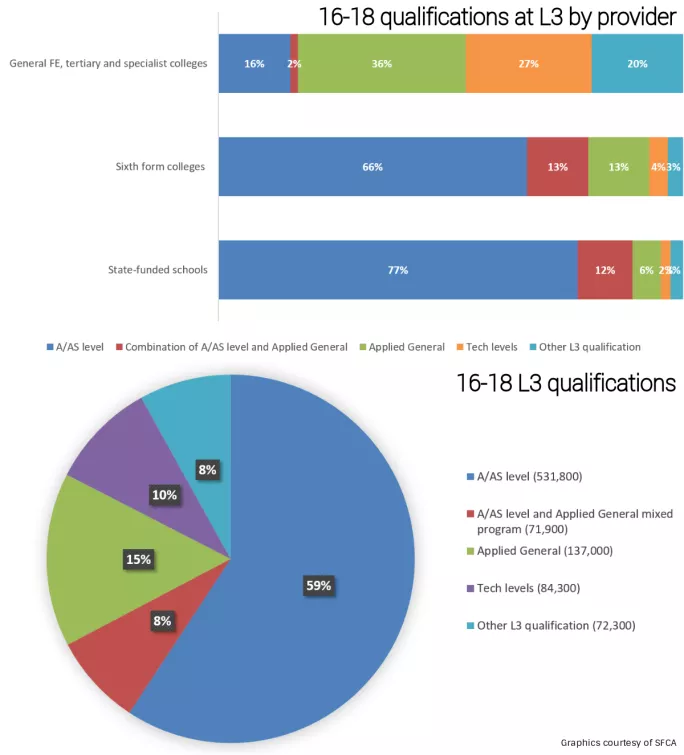
- Home
- Long read: Applied Generals in a battle to survive
Long read: Applied Generals in a battle to survive

The fate of the Applied General (AG) hangs in the balance.
These level 3 qualifications are for post-16 students who want to continue their education through applied learning. With the primary focus at the Department for Education being on the creation of its flagship T levels, it would be easy to assume that AGs are peripheral.
But far from it. Last year, 209,000 16- to 18-year-olds were working towards AGs; over half (54 per cent) of those were studying in a general FE, sixth-form or a specialist college.
The AG qualification encompasses a wide range of courses, but 78 per cent are either BTECs (awarded by Pearson) or Cambridge Technicals (offered by OCR).
In its long-awaited response to the T-level qualification, the Department for Education said it plans to proceed with its review of level 3 qualifications to decide which should be funded for school leavers. A levels – which have recently been reformed – will be excluded, as will T levels, which will not be taught until 2020.
With the introduction of T levels, the government aims to streamline the 13,000 or so technical qualifications on offer into 15 T-level routes to present a clearer choice for 16- to 18-year-olds between A levels and T levels.
But what will happen to AGs, an academic qualification that a quarter of 16- to 18-year-olds take in some shape or form?
T-level consultation
The government set out three requirements for level 3 qualifications:
- They have a distinct purpose, and are truly necessary in the new simplified system.
- They are good quality.
- They support progression to good outcomes.
In the T-level consultation response, two-thirds of respondents agreed with these criteria. The DfE also acknowledged "concerns" about removing AGs, which respondents felt were "well-established and supported by employers" and "successful in supporting student progression".
The report continues: "We expect to engage widely as the review is designed to properly understand the impact of the process. We expect that decisions resulting from this review will be implemented in line with the timeline for the introduction of T levels. However, this would not affect our ability to make decisions about funding in other contexts."
The DfE said it will set out more details about the review process "in due course", explaining how it will address these concerns.
Tom Bewick, chief executive of the Federation of Awarding Bodies, said it was encouraging that sector stakeholders, as well as employers, would be consulted.
“[The consultation] does seem to be suggesting that, in the government’s words, where there are ‘meaningful outcomes’ related to these qualifications, they will likely continue to fund them," he said. “I suppose my retort back to that phrase would be, can the government define what a meaningful outcome is? If they are clear about that, then we can respond with evidence and respond accordingly.”
Academic versus vocational
A study commissioned by the Office of Qualifications and Examinations Regulation (Ofqual), and circulated last October, said the “vast majority” of education stakeholders do not view the AGs as an academic qualification. The paper added: “They are typically seen as vocational or ‘middle’ qualifications that sit between the academic routeway of A levels and the vocational routeway of tech levels.”
In the government response to the Sainsbury review, however, it is clear that the government classes AGs as an academic option. This could offer them a lifeline. In its T level action plan, published last October, the DfE said in time T levels will replace most of the technical provision currently funded for 16- to 19-year-olds.
Where are AGs taught?

The AG is the most popular type of qualification for school leavers to study at a general FE college, with more than a third (36 per cent) opting for the qualifications. Meanwhile, more than a quarter of students at sixth-form colleges took AGs on their own or with A levels.
AGs were introduced in 2014 and met the DfE’s interim requirements for inclusion in performance tables. A new set of AGs qualifications, meeting the DfE’s full requirements, was available to teach from September 2016. These qualifications contained at least 40 per cent “must-pass external assessment” – a hurdle unique to the reformed qualifications.
Unlike the reformed GCSE and A levels – of which the old formats were scrapped – both the old and new formats of AGs are still available to teach. The chief executive of the Sixth Form Colleges Association, Bill Watkin, believes this could prove to be the qualification’s downfall.
“It is not clear to many why the old format is not being phased out,” he said, “But the unsurprising consequence of this decision is that the majority of sixth-form teachers are remaining with the old. The trouble is, this is not necessarily good for the future of the AG.
“Stick with the old, and the risk is that the government will not value the AG as a rigorous, high-value qualification.”
Catherine Sezen, senior policy manager at the Association of Colleges, said that while non-T-level qualifications will be subject to further review, the AoC welcomed the government’s commitment in the consultation response to engage with providers during this review.
"AoC also welcomes DfE plans to discuss the allocation of Ucas points to T levels to support progression to HE, something AoC called for in our consultation submission," she added. The AoC consultation submission referred to the 140,000-plus students currently on AGs in colleges. These qualifications lead to both employment and higher education.
"If any changes are to be made to the current offer, consideration needs to be given to the provision of effective transition arrangements for colleges, teachers and students. It must also be remembered that some key AGs subject areas, such as sport and performing arts, which are of great value to the economy, continue to sit outside the T-level routes.”
Improving social mobility

“It would stifle creative students’ educational and employment opportunities. There are a host of practical issues around the work placement requirements of T levels in the creative sector, which will be hard enough in a metropolitan centre, but will hugely disadvantage students from rural areas like ours.”
AG qualifications in creative subjects have a strong track record, she added. “They fit our students’ passions and interests and enable them to learn in different and flexible ways. Few are yet ready to narrow down their career choice to a single role or sector, nor should we ask them to. The majority successfully progress to higher education and then into an exciting diversity of roles across the creative industries and wider creative economy.”
East Norfolk Sixth Form College principal Dr Catherine Richards (pictured above, middle) said AGs can improve social mobility in deprived areas. “Applied courses are extremely important at our college as we develop our study programmes to meet the needs and interests of our students.
“Students are able to choose over 100 different combinations; for example, BTEC engineering with A-level physics and A-level maths. This allows them to leave us at 18 and go on to higher education, into employment or apprenticeships.
“Our progression rates to higher education are higher than England and this is partly due to offering such a mixed range of courses. Great Yarmouth has high levels of deprivation combined with low social mobility, but offering programmes that meet the needs of our students means we are the top college for positive destinations locally.”
Paul Britton, vice-principal of Nelson and Colne College’s sixth form (pictured above, right), said that without the AG option, students will be forced into an “unnecessary choice at 16” between a degree route and a technical route.
He added: “AGs offer an excellent route for those students who do not perform at their best under examined conditions but have the ability to be excellent future workers in degree-level occupations such as social work, legal and many practical science-based careers.”
Register with Tes and you can read five free articles every month, plus you'll have access to our range of award-winning newsletters.
Keep reading for just £4.90 per month
You've reached your limit of free articles this month. Subscribe for £4.90 per month for three months and get:
- Unlimited access to all Tes magazine content
- Exclusive subscriber-only stories
- Award-winning email newsletters
You've reached your limit of free articles this month. Subscribe for £4.90 per month for three months and get:
- Unlimited access to all Tes magazine content
- Exclusive subscriber-only stories
- Award-winning email newsletters



